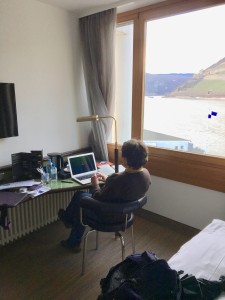
From my writing desk, in Bingen, looking down the Rhine

At Bingen, looking down the Rhine.
Expansion to Eibingen
Hildegard’s fingers tap restlessly
on the refectory table.
A new plan consumes her mind.
She moves to the podium
tucks back some loose strands of grey hair,
smoothes her veil
waits for her sisters to end supper.
She looks around.
A hundred sisters sit close in lines
share their own produce,
freshly baked spelt bread,
honey, warmed grape wine.
Hildegard breathes the aroma
of the delicious broth,
a recipe she has created
for their health.
Her mind holds a bold horizon
as the shape of Rupertsberg
grows its silhouette into the sky.
Its soul is their singing, her music.
Hildegard inspires their hearts
again with the bravery of St Ursula.
Her voice lowers,
My gaze is drawn across the Rhine
to the hamlets and people of Eibingen.
To a destroyed, abandoned convent.
How the local people beckon
for our sisters.
Chatter buzzes, hums
like a hive of Odelia’s bees.
Excitement palpable.
They imagine the old buildings
brought to life again
by their efforts.
On the first Sunday of Lent
Hildegard crosses the busy Rhine
with thirty volunteer sisters
to found a new convent
amongst the people of Eibingen.
Sister Inez, chosen the new Magistra.
The monk Volmar comes to bless them.
Carpenters and stone masons
follow, enthusiastic about a new project.
On the return journey,
the smell of the river captivates Hildegard.
Undeterred by the rough swell,
she turns to Volmar,
We will visit twice a week
to encourage and support them
The buildings and spires of Ruperstsberg
from the perspective of the Rhine
catch warm rays of a sun, deep in their hearts.




